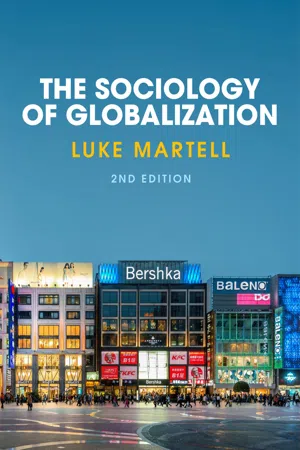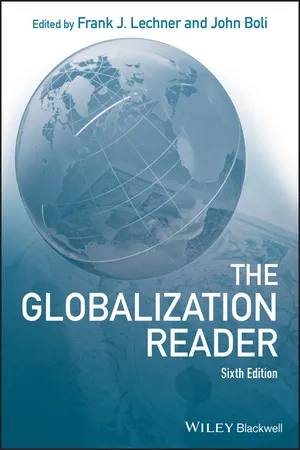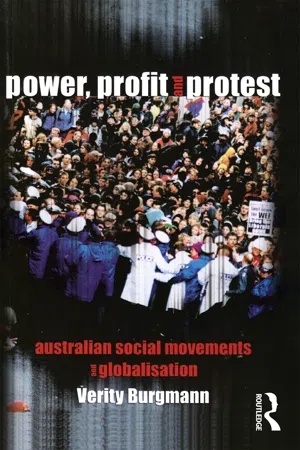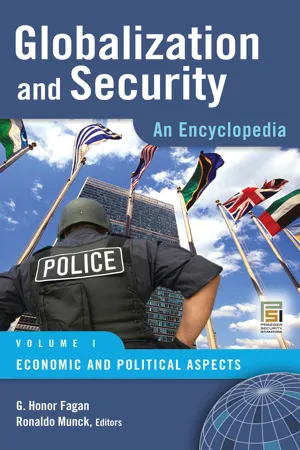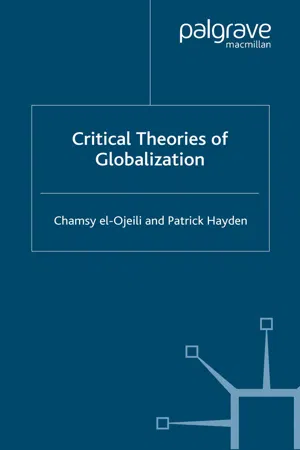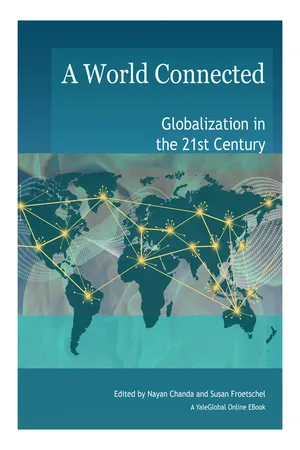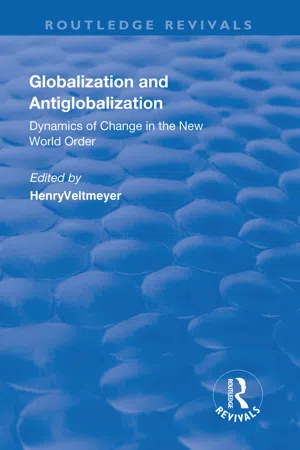Economics
Anti Globalization Movement
The anti-globalization movement is a social and political movement that emerged in the late 20th century, advocating for the protection of local economies, cultures, and environments from the negative impacts of globalization. It is characterized by protests against international trade agreements, corporate power, and economic inequality. The movement seeks to promote fair trade, sustainable development, and social justice.
Written by Perlego with AI-assistance
Related key terms
1 of 5
12 Key excerpts on "Anti Globalization Movement"
- eBook - ePub
- Luke Martell(Author)
- 2016(Publication Date)
- Polity(Publisher)
The movements I am looking at in this chapter are sometimes called anti-globalization movements. We shall see shortly why, and how this name may have some limitations. They are also sometimes referred to as global justice movements, a narrower term that applies better to anti-globalization movements with specifically social justice concerns, than to others that are, say, nationalist or protectionist. The movements are also sometimes referred to as alter-globalization.Anti-globalization
The oppositional character of the anti-globalization movement is captured by the ‘anti’ in its name. What specifically are its concerns, what is global or anti-global about it, and how has it come about (see Gill 2000)?The movement is principally against neoliberal globalization. This is seen as giving power to big corporations and the state in rich countries so that they can gain access to developing world markets, exploit cheap labour and loosen environmental standards. The actions of big corporations globally lead to cultural globalization and a loss of cultural diversity, as argued in chapter 4 . These corporations override the rights of indigenous peoples and can exploit local areas and then move on if, say, local environments are exhausted or polluted, leaving the consequences for the local inhabitants. Some anti-globalizers want greater equality of mobility, with free movement for people as well as capital, or perhaps greater constraints on capital. However, nationalist anti-globalizers want more restrictions on immigration. Free trade is seen to occur in a relationship of inequality between rich and poor countries, and inconsistently, as rich countries maintain protection or subsidies for their own industries and agriculture while expecting openness from the developing world. As far as capital mobility goes, anti-globalizers want to see greater fairness and justice in corporate behaviour, especially towards people in developing countries. Organizations or treaties which are seen to facilitate free trade and the freedom of capital to exploit local communities are strongly opposed, for instance the World Bank, the IMF, agreements of the G8 and WTO, the NAFTA area, the OECD’s Multilateral Agreement on Investment and TTIP.A related key concern is with democracy. Anti-globalization movements want to rescue democratic control for ordinary people. They say it has been taken from them and put in the hands of states, unaccountable corporations and international bodies. These constitute an alliance that is pushing for global neoliberalism, privatization, deregulation and open markets. The democratic aspect is that neoliberalism has almost been locked in by these actors, who are unaccountable, as a common-sense norm and basic part of the organization of economic and political life. So, in institutions such as the EU, the WTO and the NAFTA bloc, bodies have been established whose raison d être - eBook - ePub
Anti-Americanism in Europe
A Cultural Problem
- Russell A. Berman(Author)
- 2013(Publication Date)
- Hoover Institution Press(Publisher)
However, objective measurements are just one side of the story; subjective experience is another. Whether one sees globalization as a long-term feature of economic life or as a largely recent phenomenon, it is clear that the public discussion of globalization and, more precisely, the protest movement against globalization emerged suddenly during the 1990s, and this antiglobalization movement continues to resonate in many quarters around the world. (There is some irony in the fact that antiglobalization spread rapidly and with ease across international borders, exemplifying a certain cultural globalization: there is nothing more globalized than the opposition to globalization.) Given the articulation of antiglobalization sentiment in diverse contexts, it is not surprising that political motivations and sentiments are not uniform or homogenous. Hostility to globalization is driven by distinct interests and arguments in different locations: opposing McDonald’s franchises in France is not necessarily cut from the same cloth as opposing free trade in developing countries. Nonetheless, there is a shared idiom of protest against globalization that characterizes a subculture from Berlin to Berkeley. At its center is an economic claim. Although most professional economists see free trade and antiprotectionism as preconditions for the production of wealth and overcoming poverty, the critics of globalization typically reject this neoliberalism and call in various, if often vague, ways for regimes of increased protectionism and regulation. On one level, the critique of globalization is therefore about the appeal for increased political intervention in economic processes.Indeed, the critique of globalization has become the predominant form of anticapitalism in the post-Communist era. Antiglobalization is not only about a protest against transnational processes; it is also about a positive advocacy for expanded political restrictions on the economy. The collapse of the Soviet Union and its satellite states marked the conclusion of a history of an economic idea, the ideal of the planned economy associated with Communism since 1917; the remaining power of Communist parties in China, North Korea, Vietnam, and Cuba clearly has nothing more than a residual character. Communism certainly no longer projects a world-revolutionary project, as was once the case in the heyday of Russian prominence. Yet while the Communist critique of capitalism has essentially ceased to command any serious attention, the critiques of globalization have taken its place, continuing the attack on the market economy, typically with no reflection on the historical failure of the communist enterprise. It is therefore more than a coincidence that antiglobalization became a popular ideology only once the bipolar world of the cold war came to a definitive end: it has filled the space that Communism vacated. - eBook - ePub
- Frank J. Lechner, John Boli, Frank J. Lechner, John Boli(Authors)
- 2019(Publication Date)
- Wiley-Blackwell(Publisher)
After the tumultuous protests in 1999 directed at the World Trade Organization conference in Seattle, meetings of international financial institutions and leaders became the prime targets of people and groups opposed to their policies. Large demonstrations decrying globalization were organized across Europe. In 2001, groups critical of globalization gathered in Porto Alegre, Brazil, for the World Social Forum, which became an annual counterpoint to the elite World Economic Forum held in Davos, Switzerland. Initially, the groups behind these and similar actions were described as the anti‐globalization movement, and they signaled an important shift in both popular and scholarly views of globalization. The generally positive, at times even exuberant tone of discussions of globalization in the 1990s was swept aside by a global backlash. Globalization, the critics said, was hardly a panacea for the world’s ills; it was in fact the main culprit behind many global problems. For groups engaged in this backlash, globalization has a particular meaning: it is primarily an economic force, emanating from the West, that imposes an unjust, unequal, and environmentally harmful capitalist system on the world to the detriment of local cultures and democratic self‐control. This critical view has shaped subsequent global discourse about globalization. To some extent, globalization now is what its critics make of it.The anti‐globalization label turned out to be a poor fit, not least because many features of globalization – including world‐spanning communication and transportation systems, the global monetary system, and world science and knowledge dissemination – are crucial to the movement, which itself is decidedly global. As the movement became more coherent and interconnected, the term “alternative globalization” began to displace the original label, reflecting a succinct phrase habitually invoked by the movements’ members, “Another world is possible.” The core problem was not globalization as such but the kind of globalization promoted by transnational corporations (TNCs), global finance, and elite capitalist classes. This form of globalization was the major source of inequality, exploitation, and oppression in the world, and only a determined global justice movement could begin to ameliorate capitalism’s destructive and discriminatory consequences.The alternative globalization and global justice movement encompasses many groups, from students protesting athletic apparel produced in sweatshops to peasants resisting transnational corporate control of their land and seeds; from indigenous groups defending their forest habitat to religious leaders seeking debt relief for developing countries; from labor unions concerned about the impact of free trade to feminists opposed to trafficking in young women. Transforming globalization can take many forms, and the alternative globalization movement is nothing if not diverse. This diversity reflects the fact that, for many people, “globalization” has become an all‐purpose pejorative term. As a result, a wide range of problems are now routinely attributed to globalization and groups pursuing disparate goals increasingly unite behind the alternative globalization banner, making it difficult to articulate a widely supported alternative. But, as the readings in this part confirm, to describe the movement simply as resistance to, or an unthinking rejection of, globalization is to underestimate the global intent they share, which is to remake world society in accordance with principles that often conflict with established institutions. - eBook - ePub
The Rise of Lifestyle Activism
From New Left to Occupy
- Nikos Sotirakopoulos(Author)
- 2016(Publication Date)
- Palgrave Macmillan(Publisher)
2004 , p. 13). Thus, at a time when the left was in soul-searching mode, the cause of global inequalities and of resisting a new opponent, ‘neo-liberalism’, led to the building of a global movement targeting the perceived malfunctions of globalization: the so-called ‘anti-globalization, or ‘alter-globalization’, or ‘Global Justice’ movement.One main characteristic of this movement is its diversity and the multiple forms it took. Carter and Morland describe it as a heterogeneous network, linking local, national and international campaigns and addressing a variety of issues (2004 , p. 86). This multiplicity has to do with the fact that the movement, rather than having specific tangible goals, aimed to oppose the various alleged evils of globalization, which according to Kiely are the following (2006, p. 166):- (a) intensified exploitation of labour (an alleged global ‘race to the bottom’ in terms of wages and social welfare)
- (b) increasing social inequality
- (c) political inequality (within a state and among states)
- (d) cultural homogenization, based on the Western consumerist model
- (e) increased environmental degradation.
Setting a date for the beginning of this movement is a difficult task; however, since the Zapatista uprising in the Chiapas province of Mexico against the NAFTA agreement has been iconic for a new generation of activists, one might identify 1994 as the symbolic starting point. In 1995 the Corporate Watch network was established in the UK as a watchdog for the activity of multinational corporations, in order to raise awareness and organize campaigns and boycotts on a global scale. In the following two years, the Zapatistas called two international meetings (encuentros ) for diverse groups of people, institutions and politicians opposing ‘neo-liberalism’ to gather, join forces and multiply power through a global solidarity network (Wall 2005 , pp. 5–6).The anti-globalization movement made headlines for the first time because of the protests that took place at the World Trade Organization (WTO) Ministerial Conference in Seattle in late 1999. There, a wide coalition of anarchists, leftists, trade unionists, environmentalists, religious groups, NGOs, local and international activists, violent and non-violent protesters, managed to obstruct and finally block the WTO meeting (Graeber 2009 , pp. 18–23). Protesters in Seattle faced a considerable police backlash; however, through the three-day ‘Battle of Seattle’ the movement acquired a point of reference and a symbolic identity. The legacy of Seattle has been so powerful that events as remote in time as the December 2008 riots in Greece, in the wake of the shooting by police of a 15-year-old student, have been considered part of the cycle of struggles that started in Seattle (Kioupkiolis 2011 , p. 61). Huge protests by the so-called ‘anarchist travelling circus’ (as it was described by Tony Blair) accompanied further gatherings of the political elite, such as the International Monetary Fund’s (IMF) summit in Prague in September of 2000 and a Quebec meeting on the creation of an American free trade area (Wall 2005 - eBook - PDF
Quebec
State and Society, Third Edition
- Alain G. Gagnon(Author)
- 2019(Publication Date)
- University of Toronto Press(Publisher)
LEM I RE Anti-Market Globalisation Social Movements 247 Overview of an International Mobilization Criticisms of forms of domination transcend history, as is the case for the struggles that arise from those situations. Similarly, actions taken against government policies and interstate treaties are, in no way, new phenomena. Nevertheless, the character-istics of the international mobilization against neo-liberal economic globalization are sufficiently clear to permit us to situate it, according to its most visible demon-stration in time and space. One of the principal events leading to the appearance on the public scene of this international opposition appears to have been the disclosure over the Internet in the spring of 1997 of dealings that had been kept secret by 29 countries who had been engaged for two years in negotiations aimed at concluding the Multilateral Agreement on Investment, the MAI. Although other economic accords, notably the Free Trade Agreement (FTA) signed in 1988 by Canada and the United States, had raised the ire of groups and individuals, the sudden revelation of the existence of the MAI sparked a debate of a scope, vigour, and spontaneity such as had never before been seen in relation to negotiations of this sort. 11 In Canada, the opposition was stronger than that against the FTA. 12 Negotiated between 1995 and 1998 by the members of the Organization for Economic Co-operation and Development (OECD), formed essentially of rich countries such as Canada, the MAI was aborted shortly after France pulled out of the negotiations in face of, among other factors, the observed resistance to it. Since then, the opposition to neo-liberal economic globalization has continued to confirm its place as a persistent and deep-rooted social force, as is attested to by the new mobilization against the FTAA. - eBook - ePub
Power, Profit and Protest
Australian social movements and globalisation
- Verity Burgmann(Author)
- 2020(Publication Date)
- Routledge(Publisher)
However, no matter how much the critics of corporate globalisation explain the real nature of their objections, their opposition is most commonly branded in the media and by politicians as 'anti-globalisation'. As Canadian journalist and anti-corporate campaigner Naomi Klein observes, this term makes the movement vulnerable to stock dismissals like: 'If you are against trade and globalization why do you drink coffee?' (Klein 2001c, p. 87). Antonio Negri insists it is 'comic' to talk of the 'anti-globalisation' forces:The S11 mobilisation outside Melbourne's Crown Casino, 11-13 September 2000 (Susan Hawthorne, copyright 2000).As a good Marxist, I have never been against globalisation, merely against the current capitalist regime that dominates globalisation . . . I am a person who struggles against the capitalist command over globalisation (quoted in Smith, D. 2001, p. 39).Champions of neo-liberal globalisation prefer to use 'anti-globalisation' in order to imply that those who oppose them are hostile to internationalism, cosmopolitanism, technological progress and so on (see examples cited in Grenfell 2001, pp. 237, 244; Mier 2001, p. 6). This terminology is convenient to the neo-liberal globalisers, for it enables them more easily to present a false dichotomy: supposedly progressive cosmopolitan embrace of the global market or regressively xenophobic and protectionist nationalism. These are not the only positions available.Conservative opposition to globalisation: the case of One Nation
In Australia, this false dichotomy between forward-looking globalisation and backward-looking nationalism was sustained in the late 1990s by the fact that the most visible opponent of globalisation was precisely the kind preferred by the neo-liberal globalisers: the reactionary politics of Pauline Hanson's One Nation party. Sections of the vulnerable classes of rural and regional Australia (and some suburban areas of Brisbane and Sydney) turned to One Nation in desperation, expressing their distress about globalisation and their alienation from the mainstream parties by voting for One Nation. - eBook - PDF
Globalization and Security
An Encyclopedia [2 volumes]
- G. Honor Fagan, Ronaldo Munck, G. Honor Fagan, Ronaldo Munck(Authors)
- 2009(Publication Date)
- Praeger(Publisher)
3 Counterglobalization Movement(s) Graeme Chesters The rise of internationally networked forms of protest and direct action, mani- fest most prominently at such global governance summits as the Group of Eight (G8) core countries, the World Trade Organization (WTO), and the International Monetary Fund (IMF), has heralded new policing and public order challenges for host nations, as well as new descriptive and theoretical challenges for social movement scholars. State responses have largely been to delegitimize such col- lective action by applying security tropes to social movement actors. These social movement actors reside inside the ‘‘advanced’’ economies while simulta- neously being networked as global civil society actors advancing goals that tran- scend national systems of interest representation. These contemporary ‘‘folk devils’’ have been variously constructed as ‘‘violent criminals’’ and ‘‘security threats’’ and subjected to sanctions enacted in a variety of ways that reflect national and regional security and policing strategies. This has occurred despite the apparent lack of resonance of such categorizations across different national publics, where polling data suggest significant support for the actors and the issues they raise. This chapter looks at the origins of the counterglobalization movement and the forms it has taken. It examines the largely submerged history of this move- ment(s), focusing particularly on two global networks that have played a promi- nent part in its emergence and in its ongoing establishment as a space of critical engagement, dialogue, and collective action among civil society actors, cam- paign groups, social movement organizations, and others. The chapter then sug- gests resources for understanding this movement(s) and proposes a theoretical framework that seeks to account for how comparatively marginal actors can achieve global prominence when networked through computer-mediated com- munications and face-to-face gatherings. - eBook - PDF
Critical Theories of Globalization
An Introduction
- C. el-Ojeili, P. Hayden(Authors)
- 2006(Publication Date)
- Palgrave Macmillan(Publisher)
5 Resisting Globalization: The Alternative Globalization Movement Introduction In Chapter 2, we noted that social scientists regard the study of social change as one of their central vocations. This not only involves delineat- ing and analyzing extant and emerging institutions and processes of social transformation, but also thinking about the role of social move- ments. In what follows, we will examine a central contemporary social movement – the alternative globalization movement (AGM). This move- ment has been touted by some as a ‘second superpower’ announcing the return of people onto the stage of history (Yuen, 2004), and interpreted by others as a threat to the gains of contemporary globalization, and as violent, irrational, and reactive. Much of the preceding chapters have dealt with claims about, and critiques of globalization offered by the alternative globalization movement, but it is important to more closely analyze the movement as a movement. Our discussion of the AGM will range across a variety of issues, debates, dilemmas, organizations, and key figures of what is in truth a complex ‘movement of movements’. However, we will emphasize the return of a form of socialist contestation with the AGM, although there are some important points of differentia- tion between the AGM and socialism. Finally, we address the movement as an important utopian moment within contemporary globalization and, therefore, as the reappearance of utopian ‘thinking beyond’. Social movements Social movements are vital features in social change. Buechler (2000: 213) defines social movements as ‘intentional, collective efforts to trans- 178 C. el-Ojeili et al., Critical Theories of Globalization © Patrick Hayden and Chamsy el-Ojeili 2006 form the social order’. Social movements were not discussed explicitly in the social sciences until the 1960s, in the face of the rise of the civil rights, feminist, and other so-called ‘new social movements’. - eBook - PDF
A World Connected
Globalization in the 21st Century
- Nayan Chanda, Susan Froetschel(Authors)
- 2012(Publication Date)
- Yale University Press(Publisher)
290 YaleGlobal Online Global connections – whether for spreading commerce, religion or culture – and the influences of other lands have been welcomed as much as resisted. Countries and special interests have often eschewed the back and forth of global connections, wanting to send their exports and ideas out into the world but resisting the products of others. Due to a media revolution and the ability to exchange information, those affected by globalization can organize instant anti-globalization movements. Media advances spurred by the growing internet have enabled individual opponents of globalization to connect, coordinate and oppose globalization in organized ways. An online report of an atrocity can ignite the passions of strangers on the other side of the world. The 1999 demonstrations in Seattle against a World Trade Organization ministerial meeting attracted protesters from around the globe and marked a turning point. The protests, violent as they were, did not spring from nationalism; a motley group presented a global, loosely united front to challenge the lofty and remote power of governments, multinational corporations and financial institutions. Large segments of marginalized populations scattered throughout the world – the poor, the young, the unemployed – increasingly perceive globalization’s opportunities Anti-Globalization A World Connected: Globalization in the 21st Century 291 and costs as unevenly distributed among or within societies. Everyone wants to be on the winning side of globalization rather than its victim. Traditional working-class and middle-class groups in developed countries, too, have felt disenfranchised as outsourcing and offshoring have shifted jobs overseas. While globalization has helped multinational corporations and financial institutions earn enormous profits, rising income inequality has fueled anti-globalization sentiment. - eBook - PDF
- Jim Ife(Author)
- 2013(Publication Date)
- Cambridge University Press(Publisher)
As a result, the idea of globalisation has been the focus of political protest, which has taken several forms: the anti-globalisation protests of the 1990s and 2000s, the World Social Forum (set up as an 183 alternative to the global economic forums that work in the interests of business rather than communities), and the Occupy movement of 2011. We need to accept that globalisation in some form is inevitable. The technology is with us and cannot be undone; in fact it can probably only become more efficient. The problem, rather, is how that technology will be used. Globalisation may be inevitable, but the form of that globalisation is not. For community workers it would be naive to deny the existence and the importance of global communications technology and of globalisation; rather the task is to seek ways that globalisation can serve the interests of communities and of community development. To understand the influence of globalisation it is useful to think of it has being multidimensional, rather than as a monolithic movement. The dimensions of globalisation that we can identify are the economic, the cultural, the social, the political and the environmental. The problem with globalisation is that it has devel- oped far more strongly on some of these dimensions than it has on others, as it has become part of the neo-liberal project. But there can be globalisation beyond neo- liberalism. Globalisation, as currently experienced, is almost exclusively economic. It is about the integration of trade and financial markets at a global level, and the breaking down of national barriers. This concentration on the economic is to the exclusion of other international agendas, which formed the earlier internationalist ideal and which sug- gested that the idea of living in ‘one world’ meant international agendas of peace, social justice, human rights, environmental protection, education, mutual under- standing and cultural exchange. - Available until 25 Jan |Learn more
Globalization and Antiglobalization
Dynamics of Change in the New World Order
- Jonathan Rutherford(Author)
- 2018(Publication Date)
- Routledge(Publisher)
I argue that these movements provide the best opportunity for progressive change and the forces of social transformation in the struggle against capitalism and imperialism. However, the political problems involved in this process are considerable. I conclude that the Left needs to overcome its penchant for sectarian politics and unite in a common struggle. Neoliberalism and the Dynamics of Antiglobalization In the wake of the financial crisis, which hit Mexico in 1995 and then spread to Asia and elsewhere in 1997, the neoliberal model of capitalist development has been seriously tarnished, abandoned by all except for a few ideological diehards. Even erstwhile ideologues of free market capitalism such as Carlos Salinas de Gortari, the now disgraced ex-president of Mexico but once the darling of the international neoliberal jet set; George Soros, self-appointed guardian of the world capitalist system, President of the Quantum Fund and the Soros Foundation, and ‘retired’ financier, expert manipulator of the free market in speculative capital; Joseph Stiglitz, formerly chief economist at the World Bank; and—most surprisingly perhaps—Michel Camdessus, until a few years ago managing director of the IMF, all have turned against or distanced themselves from neoliberalism (Soros in Bordegaray, Soledad and Toti Flores, 2001: 66-67; Stiglitz, 1998; Salinas and Mangabeira Unger, 1999). These and other erstwhile advocates of capitalism in its neoliberal form, while wedded to the notion of globalization in its diverse dimensions, have joined critics in the search for an alternative form of organizing and developing the economy. The shared concern—not to put too fine a point to it and to exaggerate only slightly—is not with globalization per se (globalization or antiglobalization) but the form that the alternative to neoliberalism should take. At stake, as George Soros (in Bordegaray, Soledad and Toti Flores, 2001: 67) notes, is the survival of global capitalism. - eBook - PDF
Community Development in an Uncertain World
Vision, Analysis and Practice
- Jim Ife(Author)
- 2016(Publication Date)
- Cambridge University Press(Publisher)
The problem with globalisation is that it has developed far more strongly on some of these dimensions than it has on others, as it has become part of the neo-liberal project. However, there can be globalisation beyond neo-liberalism. Globalisation, as currently experienced, is almost exclusively economic. It is about the integration of trade and financial markets at a global level and the breaking down of national barriers. This concentration on the economic is to the exclusion of other international agendas, which formed the earlier internationalist ideal and which sug- gested that the idea of living in ‘one world’ meant international agendas of peace, social justice, human rights, environmental protection, poverty alleviation, educa- tion, mutual understanding and cultural exchange. With the more recent manifes- tation of globalisation, driven by neo-liberal ideology, these other agendas are seen as secondary to the needs of the global economy, with the implicit view that if the global economy can be made to work, the rest will follow. This is a global variation of economic rationalism, or economic fundamentalism, which has been the core policy assumption of many national governments: the idea that the economy comes first, and that everything else can – and indeed must – take second place to the needs of the economy. Not only is globalisation largely economic; it also represents a particu- lar school of economics, namely neo-liberalism. The economic domination of globalisation as part of the neo-liberal project is important, and suggests that the experience of globalisation is one-sided and in the interests of the powerful. It represents an assertion of the rights of capital to move anywhere and do anything in the interests of profit maximisation, but does not carry with it a corresponding assertion of the rights of people to do the same – except, of course, for the rich and powerful (Goldfarb 2006, Jeter 2009).
Index pages curate the most relevant extracts from our library of academic textbooks. They’ve been created using an in-house natural language model (NLM), each adding context and meaning to key research topics.
